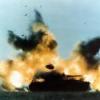Not advocating for this but if I were at the Puzzle Palace / Congressional Liaison and asked to make a slide(s) on how to do this (a national policy / mission to intervene in multiple long term humanitarian security/stabilization missions simultaneously):
1. Reinstate the draft but not implemented thru random selection and not necessarily skewed to only very young adults (18-21). If this is to be an enduring national mission then it is an enduring national responsibility for all socio-economic, cultural, racial, regional groups. Would recommend 1/5 of main ground combat forces be conscript members to balance mission objectives with human cost calculations by political & military leaders.
2. Establish military objectives and strategies that will be honored/adhered to over any changes in administration. No legal mechanism to do this so it would have to be informal and understood by all relevant parties.
3.. Levy dedicated taxes as required to pay for these operations. Funding vehicle authorized over multiple FYs to lessen administrative/political risk to sustained operations with likely political/administration changes.
4. Expand the size of the US military to accommodate high operational utilization. 30-50% expansion sounds about right/expensive.
4a. Reorganize the US military to execute these protracted / permanent missions. Delete / Curtail some conventional military capabilities to allow for further expansion of COIN-LIC-Stabilization forces (infantry, light armor, ISR, etc...).
5. Reduce deterrence presence in militarily / economically capable allied nations. Europe except for Poland, Batic countries and GB would have no significant US forces, only logistical ports/airfields. SK & Japan would also have a reduction in garrisoned forces.
6. Expand agencies for rebuilding, establishing civil societies & economies. Local populations engaged in productive labor with subsidized industries likely.
7. Temper expectations, tolerate some cultural practices that would be unacceptable in our country.
8. Begin education, cultural exchange and information programs to promote values that would increase the probability of an end state after several generations that is acceptable.
9. Massive expansion of refugee resettlement. Some situations would be impossible to stabilize, large scale resettlement would be required in some cases into the US homeland.
Laundry list of things, some military some not but what I would say is required and again to my earlier posts, for leaders to be honest about what is it that we are trying to do in this conflicts, what it will likely cost and how long it will take.
I am not advocating for this necessarily but IMHO what would be required if the US decided that as country it was a national priority to intervene when it deemed necessary into conflicts for primarily humanitarian and not national interests.
I did not even list attempting to cajole allies into this endeavor, no other country in the modern world as it is would even think about doing this.




